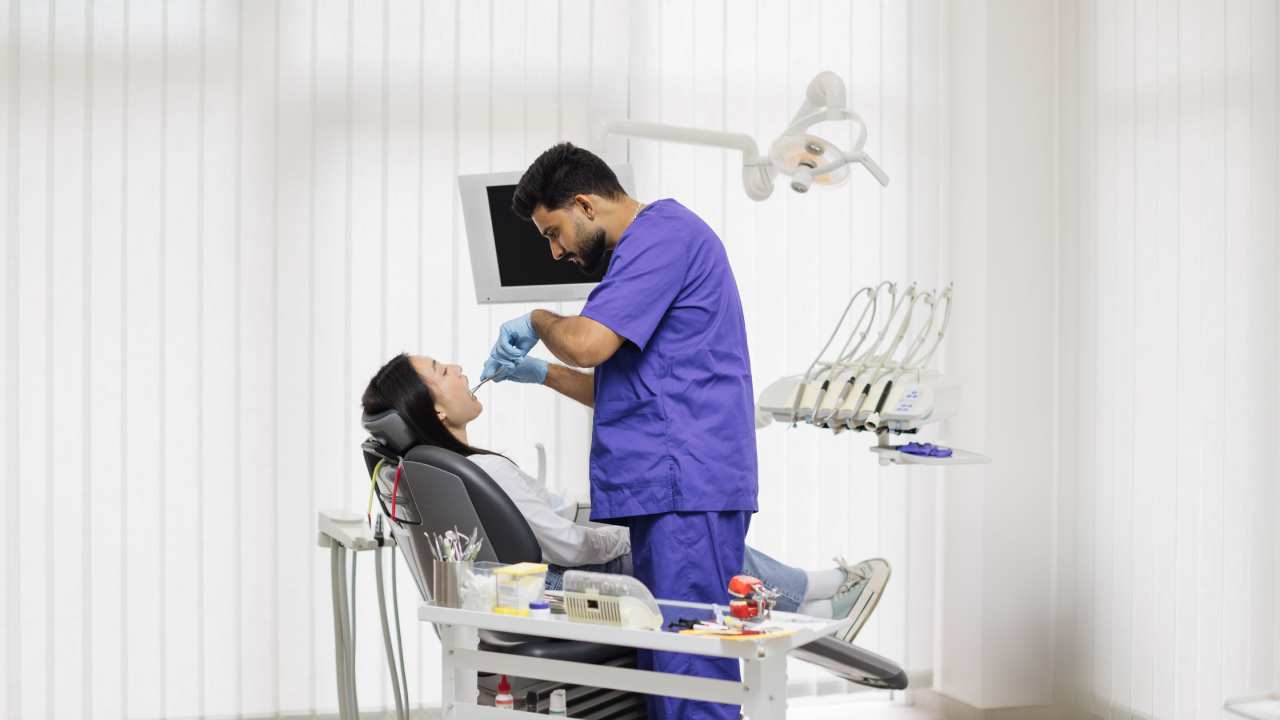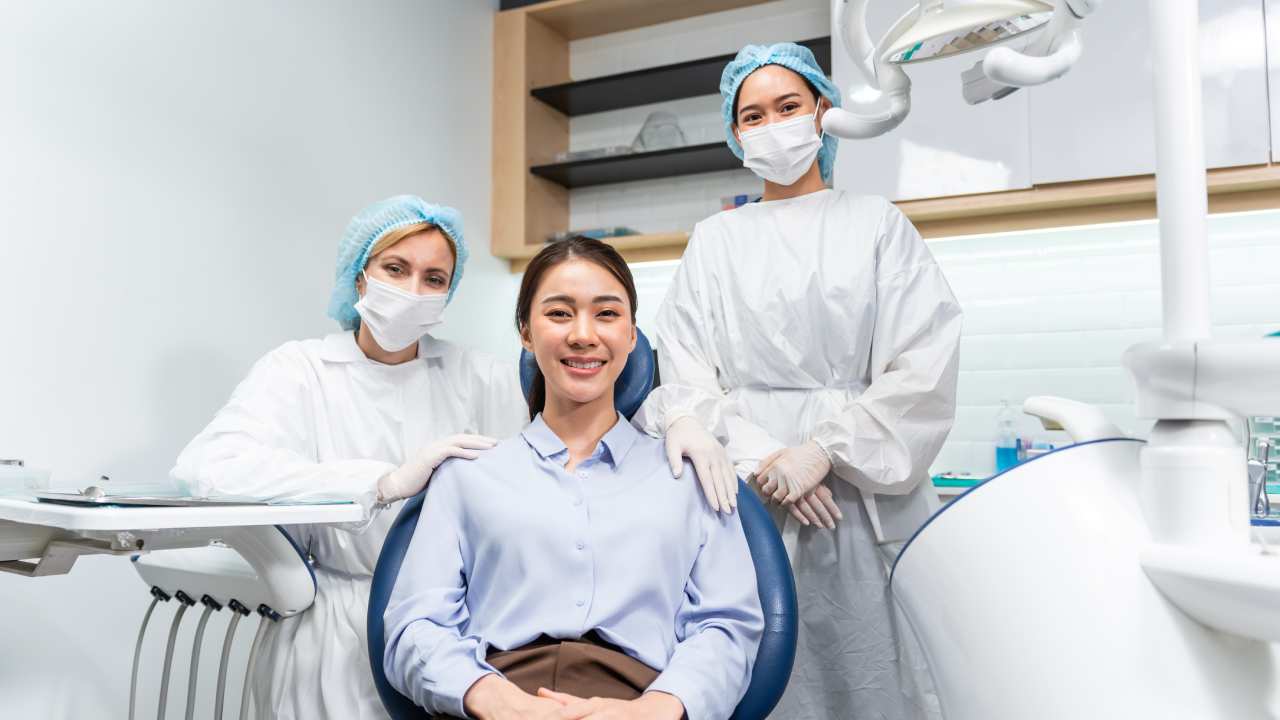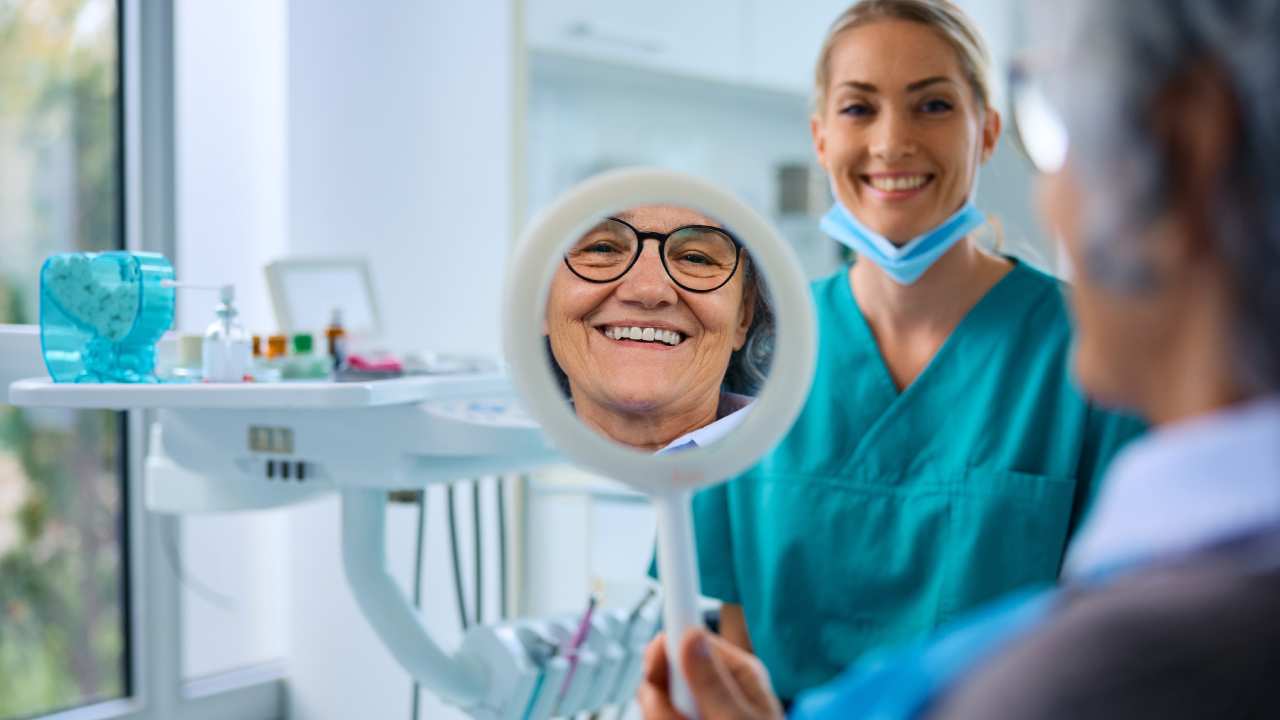Understanding oral sedation
If you have ever felt anxious about visiting the dentist, you are certainly not alone. Oral sedation offers a solution by helping you remain calm, comfortable, and at ease during treatments. Unlike general anesthesia, oral sedation uses prescription medication (often in pill form), allowing you to remain awake but significantly relaxed. You can still respond to instructions when needed, but the experience feels more manageable and less stressful overall (Cleveland Clinic: https://my.clevelandclinic.org/health/treatments/22275-sedation-dentistry).
Many individuals benefit from this approach, especially if they have a sensitive gag reflex, difficulty sitting still for extended periods, or a strong fear of dental procedures. By providing a gentle level of sedation, oral medication can reduce tension and give you the reassurance needed to complete both minor and more involved treatments with minimal distress. At Reimels Dentistry, we want you to know that your comfort matters. We believe that when you feel supported, you can receive the care you deserve without compromising your sense of security or well-being.
Benefits of oral sedation
Oral sedation has become a preferred method for many patients due to a combination of comfort, accessibility, and proven effectiveness. Here are some key advantages you can expect:
- Managed anxiety: Oral sedation lessens nervousness so you can sit through procedures like dental crown placement or root canal therapy with more confidence.
- Reduced memory of the procedure: The sedation often causes mild amnesia, which can be beneficial if you have a phobia of dental sounds or sensations.
- Continued responsiveness: You remain conscious enough to respond to your dental team—this can be helpful if you need to adjust your position or communicate specific needs (Greenville Family Dentistry: https://greenvillefamilydentistrysc.com/4-types-of-sedation-dentistry-and-when-they-are-used/).
- Ease of administration: Unlike intravenous (IV) sedation, which requires an injection, oral sedation generally only requires taking medication by mouth an hour before the appointment.
- Potential for multiple treatments in one visit: You can combine numerous dental procedures, such as a routine dental checkup and professional teeth cleaning, allowing you to save time and minimize trips to the office.
Beyond basic anxiety management, oral sedation also helps you overcome certain physical barriers to receiving treatment. For instance, if you have trouble controlling your gag reflex, sedation can diminish discomfort and help you remain more still while the dentist works. This can be particularly beneficial for services that require precision, such as digital xray imaging or intraoral camera examination.
How it compares to other sedation methods
There is no one-size-fits-all approach to sedation. Instead, you have options that fit various comfort levels, medical conditions, and procedural requirements. Consider the following common categories of sedation, along with a brief overview of each:
| Sedation Method | Level of Sedation | Administration Method | Key Benefits |
|---|---|---|---|
| Nitrous oxide | Mild (conscious) | Inhaled through a nose mask | Fast recovery, you can drive yourself home (in most cases) |
| Oral sedation | Mild to moderate (conscious) | Taken by mouth (pill or liquid) | Reduces anxiety effectively, easy to administer, partial amnesia |
| IV sedation | Moderate to deep (conscious or twilight sleep) | Medication delivered intravenously | Deeper sedation, rapid onset, dose can be adjusted as needed |
| General anesthesia | Deep (unconscious) | In-office or hospital setting via IV or mask | Complete unconsciousness, recommended for lengthy or highly complex procedures |
Nitrous oxide sedation, also called “laughing gas,” is often used for mild or moderate nerves and has a fast offset. However, it might not provide enough relaxation for someone with severe anxiety. Meanwhile, IV sedation is a deeper level of conscious sedation, suitable when you need a significant reduction in awareness (Cleveland Clinic: https://my.clevelandclinic.org/health/treatments/22275-sedation-dentistry).
Oral sedation falls ideally between these options. You stay relaxed yet communicative, with most of the procedure passing by in a haze. You will likely need a friend or family member to drive you home afterward because the medication can temporarily affect reaction times and memory. Although typically more powerful than nitrous oxide, oral sedation does not usually reach the same level of depth as IV sedation—an important detail if you require more extensive procedures (Maryland Sedation Dentist: https://marylandsedationdentist.com/oral-vs-iv-sedation-dentistry/).
Preparing for your appointment
If oral sedation seems like a fit for you, be sure to discuss your full health history at Reimels Dentistry. We believe in personalized treatment plans, so it is vital to share any relevant details about medical diagnoses, allergies, or daily medications. This information helps your dentist select the appropriate sedative and dosage suited to your needs (NCBI Bookshelf: https://www.ncbi.nlm.nih.gov/books/NBK592406/).
Below are a few additional tips to help you prepare:
- Plan for a driver: Because sedation can leave you drowsy or disoriented, arrange a ride home.
- Avoid eating or drinking for a set period: Your dentist may recommend fasting for a few hours before your procedure, particularly if higher doses of sedation are used.
- Wear comfortable clothing: You will rest in the dental chair for some time, so comfort is key.
- Ask questions: If you have any concerns about safety, effectiveness, or side effects, do not hesitate to talk them through with your dental team.
When you arrive, your dentist or team member will confirm that you have followed pre-appointment guidelines. They will also chat with you about what to expect. In many cases, you can take a pill about an hour before your treatment. Depending on the type of medication, you may already feel relaxed by the time you sit down in the dental chair.
Supporting your preventive, restorative, and cosmetic care
Oral sedation is highly versatile, making it useful across a range of vital dental services at Reimels Dentistry. Whether you need a fluoride treatment, a more in-depth procedure such as tooth extraction, or a transformative cosmetic smile makeover, sedation can be a valuable tool in easing anxiety.
- Preventive care: Services like a professional teeth cleaning or oral cancer screening are essential to maintaining oral wellness. Oral sedation can help if you find routine visits stressful or have neglected checkups due to fear.
- Restorative care: If you have put off important procedures like dental infection treatment or gum disease treatment, oral sedation can give you a calming experience so you can receive care before problems worsen.
- Cosmetic enhancements: Feeling uneasy about the chair can keep you from achieving the appearance you have always wanted. With sedation, options like porcelain veneer placement or invisalign service can be pursued in a more serene environment.
For more complex cases, such as multiple tooth extractions or a combination of restorative and cosmetic treatments, sedation offers continuity, meaning you can accomplish more in a single session. This not only minimizes time spent at the office but also reduces the number of times you have to face dental anxiety. Generally, the plus side of sedation is that many patients feel less emotional or physical drain after appointments, compared to going through high-stress visits without sedation support.
Why choose Reimels Dentistry
Selecting a partner for your dental care is a significant decision. Each patient we see at Reimels Dentistry has unique challenges—from busy schedules to varying degrees of anxiety. Our philosophy focuses on creating a supportive environment where every patient feels heard, respected, and thoroughly cared for.
- Individualized plans: Oral sedation is part of our broader medication management for dental anxiety approach. We tailor our sedation strategies, ensuring the right dose and medication type for your specific comfort requirements.
- Comprehensive care: From a straightforward routine dental checkup to more in-depth services like bone grafting ridge preservation, you can rely on Reimels Dentistry to utilize the latest techniques and tools. By keeping everything under one roof, we provide continuity of care that streamlines your experience.
- Advanced technology: Our commitment to innovation ensures we integrate modern equipment such as 3d cone beam imaging and digital xray imaging. Pairing advanced diagnostics with a considerate sedation approach gives you top-tier service on all fronts.
- Patient-centered focus: We understand that empathy and clear communication make a world of difference. Rather than rushing you, we take time to explain everything in detail, from sedation steps to post-procedure instructions. If you need any additional resources, such as patient centered dental care, we stand ready to help.
- Insurance and pricing clarity: Feeling reassured about the financial side is as important as feeling confident in the chair. Our insurance friendly dental practice and transparent dental pricing initiatives minimize surprises along the way.
We also recognize that sedation dentistry is not a universal solution. After all, each person’s needs will differ. However, our expertise in sedation means you have access to a dependable, compassionate team committed to safe and effective care. We treat your health holistically, acknowledging the emotional and physical aspects of every procedure, so you can focus on healing and positive outcomes.
Addressing common concerns
It is natural to have questions about sedation dentistry, especially if you have never experienced it before. At Reimels Dentistry, we want you to feel empowered, which means providing as much information as you need. Below are scenarios where oral sedation can be particularly helpful:
- Very busy professionals needing lengthy restorative or cosmetic treatments in one session
- Patients with previous traumatic dental experiences who need reassurance and a calmer setting
- Those with strong gag reflexes that make standard procedures uncomfortable
- Individuals managing medical conditions like high blood pressure—careful sedation can help keep stress levels in check (Cleveland Clinic: https://my.clevelandclinic.org/health/articles/10909-medications-used-in-dentistry)
- Clients who struggle with moderate dental anxiety but prefer not to be completely unconscious
Side effects and safety considerations
Oral sedation, like any medical intervention, comes with potential side effects. While these are generally mild, it helps to be aware:
- Drowsiness or grogginess: You may feel sleepy for several hours after your visit (Excel Dental: https://exceldentalmissouricity.com/side-effects-of-dental-oral-sedation/).
- Dry mouth: Having water or gentle mouth rinses available post-procedure can ease this symptom.
- Slight dizziness or lightheadedness: This tends to subside as the sedation wears off, but you may want to avoid quick changes in posture.
- Memory gaps: Patients often have little recall of the procedure, which can be positive if you experience fear or discomfort.
- Allergic reactions: Though rare, make sure to inform your dentist of any known drug allergies or previous negative experiences with medications (Excel Dental: https://exceldentalmissouricity.com/side-effects-of-dental-oral-sedation/).
Dentists at Reimels Dentistry will review your medical history thoroughly to minimize risks. We also maintain a calm, closely monitored environment. If you are prone to anxiety episodes, sedation can help alleviate the stress that might otherwise impact blood pressure or heart rate. Our attention to detail means you can focus on what truly matters—achieving and maintaining a healthy smile.
Recovering after oral sedation
Recovery times vary, but oral sedation generally requires that you:
- Refrain from driving for at least 24 hours after the procedure (Cleveland Clinic: https://my.clevelandclinic.org/health/treatments/22275-sedation-dentistry).
- Rest at home, staying hydrated, and avoiding strenuous activities.
- Build in time for the medication’s lingering effects to dissipate, particularly if you have a lower tolerance or require a higher dose.
- Follow any specific aftercare instructions, such as applying gauze to extraction sites or taking prescribed pain relief, if you underwent more involved procedures like surgical tooth extraction.
If you have questions about continuing sedation for subsequent appointments, you can always discuss them with our team. We update your personalized approach as your comfort level and dental needs evolve. If, for example, you find that minimal sedation is enough to manage a standard cleaning, but more robust sedation is needed for bigger treatments (like dental bridge placement or full denture fabrication), we will adapt accordingly.
How sedation supports a positive outlook on oral health
At Reimels Dentistry, we see that many people avoid dental offices because of anxiety. This can lead to neglected oral hygiene routines and, eventually, more serious issues like gum infection, tooth decay, or even tooth loss. By integrating oral sedation into your treatment plan, you break down the mental barrier that prevents you from receiving timely care.
Equally significant is reclaiming control over your well-being. Many dental fears stem from feeling powerless in the chair. The relaxed yet conscious state provided by oral sedation helps you recognize that you do have agency—to ask for a pause, to shift position, to voice concerns. Over time, successful, lower-stress experiences at the dentist can shift your perspective on oral health. You may find yourself more motivated to schedule periodontal maintenance cleaning or that long-awaited cosmetic smile makeover.
We also encourage you to view sedation as a temporary aid that can help you prioritize crucial dental work. Some patients rely on sedation for specific procedures requiring long chair time, such as wisdom tooth removal or multiple restorations. Others consider moderate sedation an integral part of each visit, particularly if they have special medical considerations or chronic anxiety. Regardless, our approach remains the same: thorough consultation, comprehensive education, and kind support.
Combining oral sedation with advanced dental technology
When sedation and advanced technology join forces, you gain an unparalleled level of comfort and precision. For instance, if you need 3d cone beam imaging to plan an implant or to assess the structure of your jaw, sedation can help you remain still while the machine captures details for the most accurate results. The same holds true for advanced restorative tasks. If you require multiple visits, sedation may allow your dentist to accomplish much of the preliminary work in fewer sessions, letting you maintain a positive mental outlook throughout prolonged treatments.
Additionally, sedation can facilitate thorough examinations that proactively catch subtle issues. A relaxed patient tends to move less, which is ideal for capturing clear images and performing detailed evaluations. Even simpler tasks, like intraoral camera examination or digital xray imaging, benefit from a stillness that sedation helps create. In short, sedation blends seamlessly with the technology Reimels Dentistry employs, ultimately setting you up for successful outcomes.
Making sedation part of a holistic approach
Dental anxiety is just one piece of your overall experience. We realize you may also be concerned about budgeting for treatments, so we offer a dental membership plan that helps you plan for preventive and restorative care. We also maintain an insurance friendly dental practice, working with you to clarify coverage details so you know exactly what to expect.
Furthermore, we provide a variety of complementary or related treatments, from emergency dental care to sleep apnea oral appliance fitting. By connecting sedation to broader health and wellness strategies, we align with the fundamental principle of individualized plans. That means your emotional, financial, and time constraints are factored into your treatment strategy, ensuring a well-rounded solution that respects your life outside the dental chair.
FAQs about oral sedation
- Will I be completely unconscious with oral sedation?
With oral sedation, you remain awake but relaxed. It is sometimes called “conscious sedation” because you can still respond to verbal cues. Unlike general anesthesia, you do not lose consciousness, and recovery is typically faster (Gentle Dental: https://www.gentledental.com/resources/articles/advantages-and-disadvantages-of-oral-sedation). - How long does oral sedation last?
This depends on the specific medication used and your metabolism, but effects can linger for several hours. You will probably need transportation home. Plan low-key activities for the remainder of the day while the sedation fully wears off (Cleveland Clinic: https://my.clevelandclinic.org/health/treatments/22275-sedation-dentistry). - What types of procedures commonly use oral sedation?
Oral sedation is popular for moderate treatments like tooth extraction, root canal therapy, or more extended sessions for cosmetic work, such as porcelain veneer placement. It is effective for patients with varying degrees of anxiety and those requiring multiple procedures at once. - Can oral sedation help if I have a strong gag reflex?
Yes, it helps lessen oral sensitivity, which can reduce gag reflex issues. Many people who previously avoided pediatric dental care or certain X-ray techniques find sedation beneficial for staying calm and comfortable through these procedures (Greenville Family Dentistry). - Will my dental insurance cover oral sedation?
Coverage varies by plan, so check with your provider or contact our insurance friendly dental practice. Some policies cover sedation, especially when it is deemed medically necessary. Others may only cover partial costs, so our team is happy to guide you through the details for a clear understanding of benefits.
Embracing a calm, confident dental future
Oral sedation can transform your experiences at the dentist, allowing you to feel more confident in pursuing both everyday checkups and more comprehensive treatments. Whether you are anxious about an upcoming toothache pain relief visit or aiming to enhance your smile through cosmetic smile makeover, sedation reduces barriers so you can move forward more positively.
At Reimels Dentistry, we understand that your comfort is paramount to achieving a successful outcome. Our goal is to craft individualized options—ensuring you have the supportive environment necessary for lasting oral health. By combining skilled practitioners, advanced technology, and a carefully guided sedation plan, we create a path that upholds our dedication to your well-being.
If you would like more information or want to explore whether oral sedation is the right avenue for you, our team is here to help. We will walk you through the process, from scheduling to recovering, so you can focus on what truly matters—restoring and maintaining the bright, healthy smile you deserve. Feel free to reach out and learn more about our sedation dentistry service, or talk with us about other ways we can make your next visit more comfortable. We look forward to supporting you on your dental journey.







